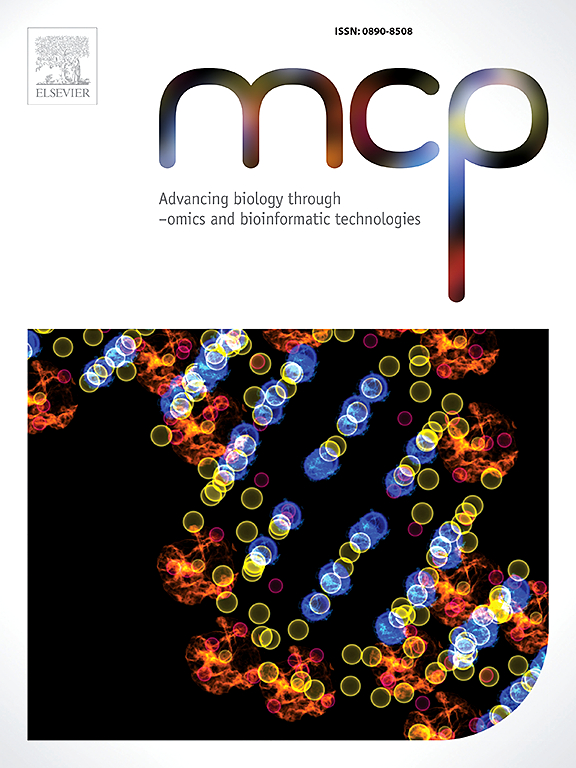RCN1影响弥漫大b细胞淋巴瘤的恶性进展和巨噬细胞M2极化。
IF 3
3区 生物学
Q3 BIOCHEMICAL RESEARCH METHODS
引用次数: 0
摘要
癌细胞的恶性行为和巨噬细胞的免疫逃避可导致弥漫性大b细胞淋巴瘤(DLBCL)治疗失败。最近的研究表明网状定位蛋白1 (RCN1)的异常表达与几种癌症的恶性进展有关。然而,其在DLBCL中的作用尚不清楚。在本研究中,几个在线生物信息学数据库证实了RCN1在DLBCL患者肿瘤样本中的高表达。此外,在我们收集的组织和DLBCL细胞的肿瘤标本中,rcn1明显升高。重要的是,在RCN1水平高的患者中观察到较短的生存结果。有趣的是,RCN1的下调降低了DLBCL细胞的活力、侵袭能力并增加了癌细胞的凋亡。此外,TIMER数据库揭示了RCN1表达与DLBCL患者肿瘤浸润性巨噬细胞、M2巨噬细胞标志物的相关性。RCN1的下调通过抑制CD163+巨噬细胞的百分比和m2样标志物(CD163、CD204和IL-10)的表达,抑制了癌细胞诱导巨噬细胞m2样极化的能力。同时,下调RCN1后,M2巨噬细胞诱导的癌细胞活力和侵袭能力减弱。进一步的分析显示,RCN1的敲低抑制了DLBCL细胞中PI3K/AKT信号的激活。值得注意的是,通过其激动剂740Y-P重新激活该途径抵消了RCN1敲低在癌细胞恶性和巨噬细胞向M2表型极化中的抗肿瘤作用。因此,RCN1可能通过直接调节癌细胞行为和间接影响巨噬细胞m2样极化而促进DLBCL的恶性进展,支持其作为DLBCL的有希望的治疗靶点。本文章由计算机程序翻译,如有差异,请以英文原文为准。
RCN1 affects malignant progression and macrophage M2 polarization in diffuse large B-cell lymphoma
Malignant behaviors of cancer cells and immune evasion by macrophage can lead to treatment failure in diffuse large B-cell lymphoma (DLBCL). Recent studies have revealed the aberrant expression of reticulocalbin 1 (RCN1) that is associated with malignant progression of several cancers. Nevertheless, its roles in DLBCL remain unclear. In this present study, several online bioinformatics databases substantiated high expression of RCN1 in tumor samples from DLBCL patients. Furthermore, there were obvious elevation of RCN1in tumor specimens form our collected tissues and DLBCL cells. Importantly, the shorter survival outcome was observed in patients with high levels of RCN1. Intriguingly, down-regulation of RCN1 attenuated DLBCL cell viability, invasion ability and increased cancer cell apoptosis. Moreover, TIMER database revealed the correlation between RCN1 expression and tumor-infiltrating macrophages, and M2 macrophage markers in DLBCL patients. Knockdown of RCN1 suppressed cancer cell ability to induce macrophage M2-like polarization by inhibiting the percentage of CD163+ macrophages and expression of M2-like markers (CD163, CD204, and IL-10). Concomitantly, M2 macrophage-induced cancer cell viability and invasion was abrogated after RCN1 down-regulation. Further assay revealed that knockdown of RCN1 suppressed activation of the PI3K/AKT signaling in DLBCL cells. Notably, reactivation this pathway via its agonist 740Y-P offset the anti-tumor efficacy of RCN1 knockdown in cancer cell malignancy and macrophage polarization towards M2 phenotype. Therefore, RCN1 may contribute to the malignant progression of DLBCL by directly regulating cancer cell behavior and indirectly affecting macrophage M2-like polarization, supporting it as a promising therapeutic target against DLBCL.
求助全文
通过发布文献求助,成功后即可免费获取论文全文。
去求助
来源期刊

Molecular and Cellular Probes
生物-生化研究方法
CiteScore
6.80
自引率
0.00%
发文量
52
审稿时长
16 days
期刊介绍:
MCP - Advancing biology through–omics and bioinformatic technologies wants to capture outcomes from the current revolution in molecular technologies and sciences. The journal has broadened its scope and embraces any high quality research papers, reviews and opinions in areas including, but not limited to, molecular biology, cell biology, biochemistry, immunology, physiology, epidemiology, ecology, virology, microbiology, parasitology, genetics, evolutionary biology, genomics (including metagenomics), bioinformatics, proteomics, metabolomics, glycomics, and lipidomics. Submissions with a technology-driven focus on understanding normal biological or disease processes as well as conceptual advances and paradigm shifts are particularly encouraged. The Editors welcome fundamental or applied research areas; pre-submission enquiries about advanced draft manuscripts are welcomed. Top quality research and manuscripts will be fast-tracked.
 求助内容:
求助内容: 应助结果提醒方式:
应助结果提醒方式:


